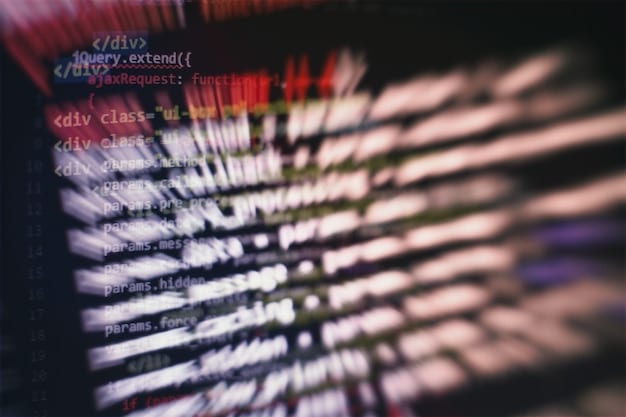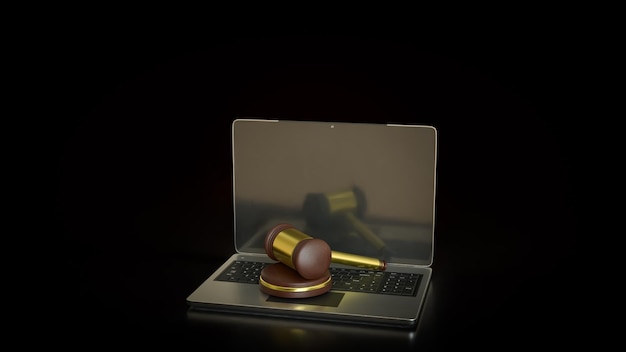Deepfake Legislation: Penalties for Entertainment Industry Violators in the US

New legislation is emerging to combat the use of deepfakes in the entertainment industry, with potential penalties for violators including hefty fines and legal repercussions designed to protect individuals and maintain the integrity of creative works.
The rise of deepfake technology poses significant challenges to the entertainment industry, leading to increasing concerns about misuse. Recent legislative efforts aim to address these issues, establishing clear guidelines and penalties for using deepfakes inappropriately. This article explores the details of the new legislation aims to combat deepfakes in entertainment – what are the penalties for violators?, its implications, and what it means for content creators and consumers in the US.
Understanding the Deepfake Threat in Entertainment
Deepfakes, synthetic media in which a person’s likeness is digitally altered to replace someone else’s, have rapidly evolved. What was once a novelty has become a sophisticated tool capable of deceiving audiences and causing significant harm, particularly in the entertainment sector. The unchecked proliferation of deepfakes raises serious concerns about privacy, defamation, and the integrity of artistic works.
The Evolution of Deepfakes
Deepfake technology has advanced significantly in recent years, making it easier and more accessible for individuals to create convincing but entirely fabricated videos and audio recordings. This evolution poses a threat to the authenticity of information and the credibility of individuals in the entertainment industry.
- Early deepfakes were often crude and easily detectable.
- Modern deepfakes leverage sophisticated AI algorithms for near-perfect imitation.
- Accessibility to deepfake software has lowered the barrier to entry for misuse.

The entertainment industry is particularly vulnerable due to the high visibility of its personalities and the value of its intellectual property. The potential for creating unauthorized content featuring actors, musicians, and other public figures can lead to significant financial losses and reputational damage.
Key Components of the New Legislation
Recognizing the potential dangers posed by deepfakes, lawmakers are now developing legislation to regulate their use, particularly in the entertainment industry. These laws aim to address the potential for misuse while also protecting freedom of speech and artistic expression.
Provisions and Regulations
The core of the proposed legislation includes various provisions designed to deter the creation and dissemination of malicious deepfakes. This involves defining what constitutes a harmful deepfake and establishing legal thresholds for prosecution.
- Defining “harmful deepfake” to include content intended to defame, defraud, or cause emotional distress.
- Establishing clear legal pathways for victims of deepfakes to seek redress.
- Implementing safeguards to protect legitimate uses of deepfake technology in art and satire.
These regulations are not intended to stifle creativity or innovation, but rather to ensure accountability and responsible use of this powerful technology. The goal is to strike a balance between fostering technological advancement and safeguarding individual rights and public trust.
Penalties for Violators
A critical aspect of the new legislation is the establishment of penalties for those who violate the law by creating or distributing malicious deepfakes. These penalties serve as a deterrent and provide a means of holding offenders accountable for their actions. The severity of the penalties will depend on the intent, scope, and impact of the deepfake content.

Financial Penalties
One of the primary forms of punishment for deepfake violations is financial penalties. These fines can vary widely depending on the specific circumstances of the case.
- Fines can range from thousands to millions of dollars.
- Penalties may be adjusted based on the scale of distribution and the monetary damages incurred by the victim.
- Repeat offenders may face significantly higher fines.
Legal Repercussions
In addition to financial penalties, violators may also face legal repercussions, including criminal charges and civil lawsuits. The legal consequences largely depend on the severity and intent behind the deepfake content.
- Criminal charges may include offenses such as identity theft, fraud, and defamation.
- Civil lawsuits can be filed by victims seeking compensation for damages to their reputation, emotional distress, or financial losses.
- In cases of intentional harm, offenders may face imprisonment.
The threat of legal repercussions is intended to dissuade individuals from creating or distributing content that could cause harm or violate the rights of others.
Protecting Individuals in the Entertainment Industry
The legislation specifically aims to protect individuals in the entertainment industry from the potential harm caused by deepfakes. This includes safeguarding their reputation, privacy, and economic interests.
Safeguarding Reputation and Privacy
One of the most significant concerns surrounding deepfakes is their potential to damage a person’s reputation or invade their privacy. The new legislation seeks to address these concerns by providing legal remedies for victims of malicious deepfakes.
Legal recourse for defamation: Victims of deepfakes can pursue legal action against those who create or distribute content that harms their reputation, seeking damages to compensate for the harm suffered, with laws that would allow individuals to sue for defamation.
Protection against privacy violations: The legislation also includes provisions to protect individuals from deepfakes that invade their privacy, such as those depicting them in compromising or sensitive situations.
Economic Interests
Deepfakes can also have a negative impact on the economic interests of individuals in the entertainment industry. For example, a deepfake video could be used to create unauthorized content featuring an actor, thereby undermining their earning potential.
Intellectual property rights: The legislation seeks to protect intellectual property rights, ensuring that creators of original content are not unfairly exploited to allow artists to control the use of their image and likeness in deepfakes.
Licensing and consent: The law may require creators of deepfakes to obtain licenses and consent from the individuals being depicted, ensuring that they are compensated for the use of their likeness.
The Impact on Content Creators and Consumers
The new legislation governing deepfakes is expected to have a significant impact on both content creators and consumers. By establishing clear guidelines and penalties, the law aims to foster a more responsible and transparent digital environment.
For Content Creators
Content creators will need to be more cautious about the use of deepfake technology, ensuring that they comply with all applicable laws and regulations. This may involve obtaining consent from individuals being depicted, providing clear disclaimers about the synthetic nature of the content, and implementing safeguards to prevent misuse.
Transparency and Disclaimers: Content creators will need to be transparent about the use of deepfake technology, providing clear disclaimers to inform viewers that the content is synthetic.
Ethical Considerations: Creators will need to consider the ethical implications of their work, ensuring that it does not cause harm or violate the rights of others.
For Consumers
Consumers will need to be more critical of the content they consume, recognizing that not everything they see or hear online is authentic. This may involve verifying the source of information, looking for telltale signs of deepfake manipulation, and supporting efforts to promote media literacy.
Media Literacy: The legislation may include provisions to promote media literacy, helping consumers to identify and avoid being deceived by deepfakes.
Critical Thinking: Consumers will need to exercise critical thinking skills, questioning the authenticity of information and being wary of content that seems too good to be true. The need of the populace to understand the potential harm caused by deep fakes will be invaluable when dealing with this new technology.
Challenges and Future Considerations
While the new legislation represents a significant step forward in addressing the challenges posed by deepfakes, there are still many challenges and considerations to be addressed in the future.
Enforcement Challenges
One of the biggest challenges will be enforcing the new laws, particularly given the global nature of the internet and the ease with which deepfakes can be created and disseminated. Cooperation between different jurisdictions will be essential to effectively prosecute offenders like the federal justice system.
Global Cooperation: International cooperation will be needed to ensure that offenders cannot evade justice by operating from countries with lax laws.
Technological Solutions: Ongoing investment in technological solutions will be needed to detect and combat deepfakes.
Future Developments
As artificial intelligence and deepfake technology continue to evolve, lawmakers will need to remain vigilant and adapt their laws accordingly. This may involve addressing new forms of misuse, refining legal definitions, and exploring innovative regulatory approaches. There are a wide variety of future deepfake tech that society needs to be diligent about regulating.
AI Governance: The future may see the development of AI governance frameworks, which set ethical standards for the development and use of artificial intelligence.
Continuous Monitoring: Ongoing monitoring of deepfake technology will be needed to identify emerging threats and adapt regulatory strategies accordingly.
| Key Aspect | Brief Description |
|---|---|
| 🛡️ Legislation Goals | Aims to deter harmful deepfakes and protect individuals. |
| ⚖️ Penalties | Includes financial penalties and legal repercussions. |
| 🎬 Entertainment Impact | Protects reputation, privacy, and economic interests. |
| 🌐 Global Challenges | Enforcement needs international cooperation and tech solutions. |
Frequently Asked Questions
▼
Deepfakes are synthetic media where a person’s likeness is digitally manipulated to replace another. They are concerning because they can be used to spread misinformation, defame individuals, and undermine trust in media.
▼
Violators can face financial penalties ranging from thousands to millions of dollars, depending on the severity and scope of the violation. Additionally, they may face legal repercussions such as criminal charges and civil lawsuits.
▼
The legislation aims to protect their reputation, privacy, and economic interests. It provides legal remedies for defamation, protects intellectual property rights, and may require licensing and consent for deepfake creators.
▼
Content creators must be more cautious, ensuring compliance with laws. They need to be transparent about using deepfake technology, obtaining consent, and considering ethical implications to avoid legal issues.
▼
Enforcement is challenging due to the global nature of the internet and ease of deepfake creation. International cooperation and technological solutions are crucial for effective prosecution and detection efforts.
Conclusion
The new legislation addressing deepfakes in the entertainment industry represents a crucial step towards safeguarding individual rights and maintaining the integrity of creative works. By establishing clear penalties and guidelines, the law aims to deter malicious use while fostering a more responsible and transparent digital environment, ensuring that the benefits of technological innovation do not come at the expense of personal and professional security.





